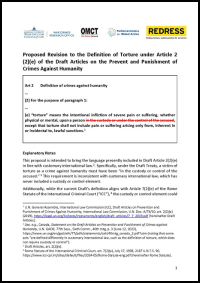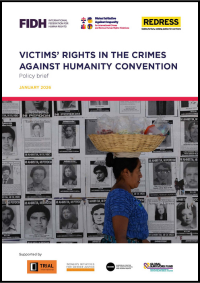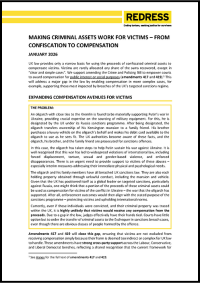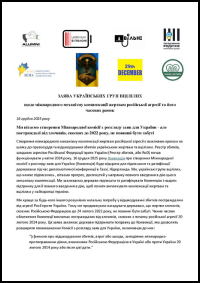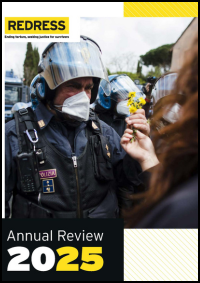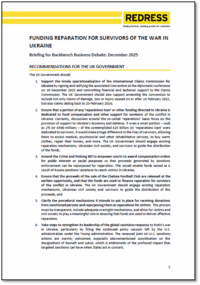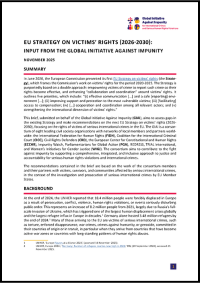Publications
REDRESS’ publications are also available in hard copy format. Please contact us for further information on [email protected].
This briefing calls for revising the definition of torture under Article 2 (2)(e) of the Draft Articles on the Prevent and Punishment of Crimes Against Humanity Convention. The briefing was prepared by REDRESS, the World Organisation against Torture (OMCT), Parliamentarians for Global Action and the Washington College of Law's War Crimes Research Office.
This briefing, prepared by REDRESS and the International Federation for Human Rights (FIDH) as part of the Global Initiative Against Impunity: Making Justice Work (GIAI), sets out concrete recommendations to ensure that the future Convention on the Prevention and Punishment of Crimes against Humanity is firmly grounded in victims’ rights and survivor-centred justice. This publication was funded by the European Union. Its contents are the sole responsibility of the organisations that produced it and do not necessarily reflect the views of the European Union.
UK law provides only a narrow basis for using the proceeds of confiscated criminal assets to compensate victims. Victims are rarely allocated any share of the sums recovered, except in “clear and simple cases”. This briefing outlines REDRESS' support for amending the Crime and Policing Bill to empower courts to award compensation for public interest or social purposes (amendments 417 and 419).
Спільна заява українських груп постраждалих щодо створення Міжнародної комісії з розгляду вимог щодо України, у якій держави закликаються підписати та ратифікувати Конвенцію, водночас наголошуючи на необхідності інклюзивного, орієнтованого на постраждалих підходу до репарацій, включно з жертвами, які зазнали шкоди до повномасштабного вторгнення.
Joint statement by Ukrainian survivor groups on the establishment of an International Claims Commission for Ukraine, calling on States to sign and ratify the Convention but stressing the need for an inclusive and victim-centred approach to reparations, including victims who were harmed before the full-scale invasion.
This annual review highlights the activities and achievements of REDRESS from 1 April 2024 to 31 March 2025, but also includes some more recent updates. It showcases REDRESS’s legal victories, ranging from a UK ruling that intelligence services must never encourage or facilitate torture to judgments in favour of survivors in Nigeria, Sudan, Lithuania, and Turkey. Alongside this casework, we championed innovative approaches to reparation, including the use of Magnitsky sanctions in Georgia, Angola, Iran, and Sudan, while strengthening the movement through partnerships, knowledge-sharing, and organisational support.
This briefing paper was prepared for the Backbench business debate on the war in Ukraine in the House of Commons Chamber last 4 December. It provides a background on the UK's response to Russia's full-scale invasion of Ukraine, victims' right to reparation and the work of the Register of Damage and the proposed establishment of the Claims Commission, and our recommendations to the UK Government on funding reparation for survivors of the war in Ukraine.
This brief, submitted on behalf of the Global Initiative Against Impunity (GIAI), assesses gaps in the EU’s first Strategy on victims’ rights (2020–2025) and sets out recommendations for the next Strategy (2026–2030), focusing on the rights of victims of serious international crimes in the EU. It examines the Strategy’s stated priorities of empowering victims, improving support and protection, facilitating access to compensation, enhancing coordination, and strengthening the international dimension of victims’ rights. The recommendations draw on the work of consortium members and partners with victims, survivors, and affected communities in the investigation and prosecution of serious international crimes across EU Member States.
